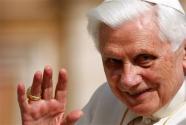By Nicole Winfield
The Associated Press
April 13, 2010
http://www.google.com/hostednews/ap/article/ALeqM5jQWrzPjAEtxgfa_tARqu5413A4PAD9F1JA800
 |
| In this March 31, 2010 photo, Pope Benedict XVI waves as he is driven through the crowd during his weekly general audience, in St. Peter's Square, at the Vatican. The uproar caused by reports that, as an archbishop years ago in Germany and later as a Vatican cardinal, Benedict and his aides were slow to defrock abusive priests, cannot be explained as the church equivalent of Watergate with the pope in the role of U.S. president. Photo by Pier Paolo Cito |
VATICAN CITY — The Vatican responded Monday to allegations that it had concealed years of clerical sex abuse by making it clear for the first time that bishops and other high-ranking clerics should report such crimes to police if required by law.
Victims have charged that the Catholic Church created what amounted to a conspiracy to cover up abuse by keeping allegations of abuse secret and not reporting them to civil authorities.
The Vatican has insisted that it has long been the Catholic Church's policy for bishops, like all Christians, to obey civil laws. In a new guide for lay readers posted on its Web site, the Vatican explicitly spells out such a policy.
"Civil law concerning reporting of crimes to the appropriate authorities should always be followed," the Vatican guidelines said.
That phrase was not included in a draft of the guidelines obtained Friday by The Associated Press. The rest of the guidelines follow previously known and public procedures for handling canonical investigations and trials of suspected abuse.
The Vatican offered no explanation for the addition.
Jeffrey Lena, the Vatican's U.S. attorney, has argued that there was nothing in the canon law that guides the church that precluded reporting.
"It's beyond dispute that the canon law does not mandate non-reporting," he said. "These guidelines may help clarify that point for people who are less familiar with canon law."
"The statement confirms what has been long known, that where the civil state creates an obligation to report, bishops like anyone else are required to examine the law and determine what they have to do to obey it," Lena told the AP.
None of the core public Vatican documents to be applied in cases of abuse direct bishops to report cases to police. Such implicit understanding of the need to follow just civil laws dates to a 1965 document from the Second Vatican Council, Gaudem et Spes.
In an agreement worked out with the Vatican, U.S. bishops made this their policy after the explosion of sex abuse cases in 2002.
The Rev. Davide Cito, a canon lawyer at Rome's Santa Croce University, called the publication of the policy in the lay guidelines "an important development."
"I'm very pleased," he said. "A Christian also has to follow civil laws. It's a Christian duty."
A Vatican spokesman, the Rev. Ciro Benedettini, said the reporting requirement had been the internal policy of the Congregation for the Doctrine of the Faith since 2003. Asked how bishops were supposed to know of this internal policy, he declined to comment.
Pope Benedict XVI had told Irish bishops last month that they should cooperate with civil authorities in investigating abuse. But the guidelines mark the first time that such procedures for the universal church, in which bishops are explicitly told they should follow civil reporting laws, have been laid out publicly.
Any original material on these pages is copyright © BishopAccountability.org 2004. Reproduce freely with attribution.